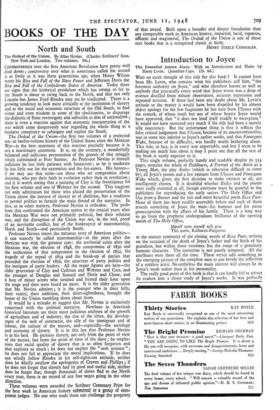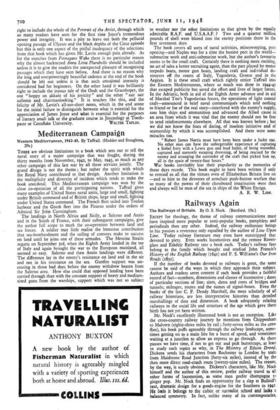Introduction to Joyce
WHO on earth thought of this title for this book ? It cannot have been Mr. Levin, who remains what his publishers call him, " the foremost authority on Joyce," and who therefore knows as well as anybody that practically every word that Joyce wrote was a drop of essence distilled from minute observation, accurate expression and repeated revision. If there had been any doubt about Mr. Levin's attitude to the matter it would have been dispelled by his almost abject apology for the few fragments he has torn from Ulysses with the remark, of whose truth but not of whose beauty Joyce would have approved, that " it does not lend itself readily to excerption." It would not have mattered very much if the title had been a merely silly inaccuracy. But the unfortunate thing is that it reflects the false critical judgement that Ulysses, because of its unconventionality, was in some way inferior to Joyce's earlier works, and that Finnegans Wake, because of its difficulty, was hardly worth bothering about. This title, in fact, is in every way regrettable, and lest I seem to be making too much fuss about it may I point out that all the rest of the book is vastly superior to it.
This single volume, perfectly handy and readable despite its 534 pages, contains the whole of Dubliners, A Portrait of the Artist as a Young Man, the play Exiles (which is otherwise difficult to come by), all Joyce's poems and a few extracts from Ulysses and Finnegans Wake which, given the first decision to make extracts at all, are intelligently chosen. It is doubtful whether Exiles and the poems were really essential at all, though everyone must be grateful to the publishers for reproducing the early satires The Holy Office and Gas from a Burner and the late and most beautiful poem Ecce Puer. None of them has been readily accessible before and each of them reveals something of Joyce the man—his humour and his pious preoccupation with the affairs of his family. There is a long way to go from the prophetic undergraduate brilliance of the opening words of The Holy Office,
Myself unto myself will give
This name, Katharsis-Purgative.
to the mature symmetry of the closing words of Ecce Puer, written on the occasion of the death of Joyce's father and the birth of his grandson, but within those extremes lies the range of a genuinely humane character. The transition is not purely temporal. All the attributes were there all the time. These verses add something to the emerging picture of the complete man to put beside the reflection of a ruthless artist. Nevertheless the main interest will always lie in Joyce's work rather than in his personality.
The really good point of this book is that it can hardly fail to attract its readers into a closer study of Joyce's works. It was perfectly right to include the whole of the Portrait of the Artist, through which so many readers have seen for the first time Joyce's tremendous power and integrity. It was a pity to leave out both the pellucid opening passage of Ulysses and the black depths of the Circe episode but this is only one aspect of the pitiful inadequacy of the selections from that book which has given Mr. Levin enough pain already. As for the snatches from Finnegans Wake there is no particular reason why the almost hackneyed Anna Livia Plurabelle should be included unless it is to give the readers the unexpected pleasure of recognising passages which they have seen before. And there is no reason why the long and overpoweringly beautiful cadence at the end of the book should be left out unless it is that such emotional intensity is considered bad for beginners. On the other hand it was brilliantly right to include the joyous tale of the Ondt and the Gracehoper, the one " hoppy on akkant of his joyicity " and the other " sair sair sullemn and chairmanlooking." It is touches like this, and the felicity of Mr. Levin's all-too-short notes, which in the end atone for the initial failure to distinguish between what is essential for the appreciation of James Joyce and what is essential for the purposes of literary small talk or the graduate course in Joyceology at Tooth-































 Previous page
Previous page